Get at least 6 FREE Stock Shares today
A dramatic chapter in Chicago’s true crime history has taken another twist. Darien Harris, a man from the city who was sentenced to 76 years behind bars for a murder conviction majorly based on an eyewitness account of an individual who, as it turns out, is legally blind, is now seeking legal redress against the city and its police department. This case highlights the perennial questions about the reliability of eyewitness testimonies and the potential prejudice that may exist within the criminal justice system.
In 2014, Harris was found guilty for his alleged involvement in a fatal shooting incident at a South Side gas station that happened back in 2011. However, it wasn’t until he had served 12 years of his lengthy prison sentence that the questionable nature of the pivotal testimony that led to his conviction began to unfold. Thanks to the investigative work of The Exoneration Project, evidence revealed that the eyewitness who identified Harris as the shooter had severe glaucoma and misrepresented this fact during the trial. This new evidence led to Harris’ release from prison in December, when he was 30 years old.
Harris’ story does not end with his release. In April, he launched a federal civil rights lawsuit against the police, alleging that they had manipulated evidence and persuaded witnesses to lie. Transitioning back to normal life has proven to be a challenge for Harris, who expressed that he’s struggling to secure stable financial assistance and gainful employment due to his criminal record. Moreover, he also voiced his difficulties in pursuing education and navigating life, noting how the incarceration has profoundly affected him.
Adding insight into his legal process, 18-year-old Harris, originally a high school senior at the time of his arrest, was identified from a police lineup by the same individual plagued by visual impairments. Despite legally being blind at the time of the incident — a condition determined by his doctor nine years before the shooting — the eyewitness maintained his ability to identify Harris both at the lineup and in court. This testimony, which on face value would appear quite solid and acted as a significant determinant for Harris’ erroneous conviction, would later be the cornerstone of his eventual exoneration.
Further adding layers of complexity to the case was the testimony provided by a gas station attendant, highlighting the dubious nature of eyewitness testimonies. This attendant, who would logically be in closer proximity to the incident, claimed in court that Harris was not the shooter. This conflicting testimony raises questions about the validity of the eyewitness’ account and the potential missteps during the criminal investigation process.
Moreover, highlighting the importance of such organizations like The Exoneration Project, which has been instrumental in securing the freedom of over 200 wrongly-convicted individuals since 2009. This includes a dozen exonerations in Cook County, where Chicago is based, in the year 2023 alone. This underscores the substantial impact such projects have on rectifying judicial errors, but also serves as a reminder of the room for improvement in our justice system.
This high-stakes spectacle of crime and punishment in Chicago truly illustrates the complexity and controversy of legal processes when it comes to solving and prosecuting crime, particularly in cases dependent heavily on eyewitness accounts. As this occurrence continues to play out in the courtrooms, the world watches, highlighting the attention that problems of eyewitness error and possible systemic bias within law enforcement can attract.
Get at least 6 FREE Stock Shares today



